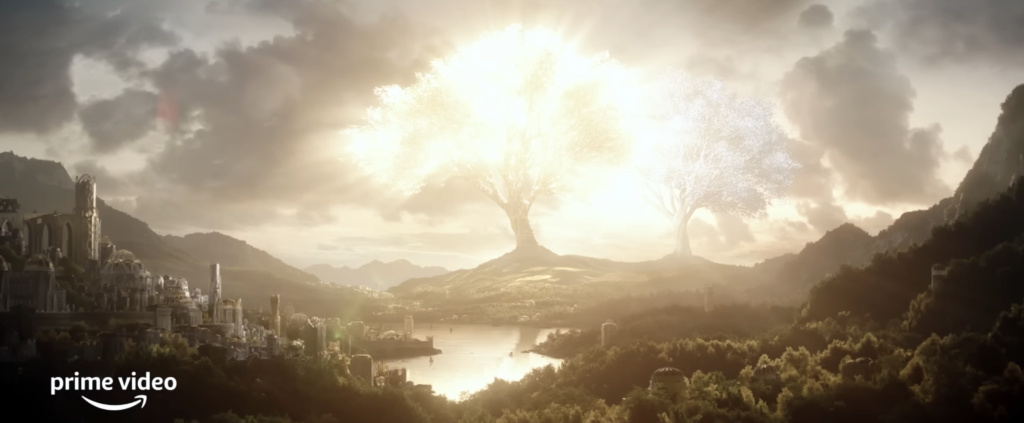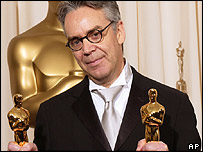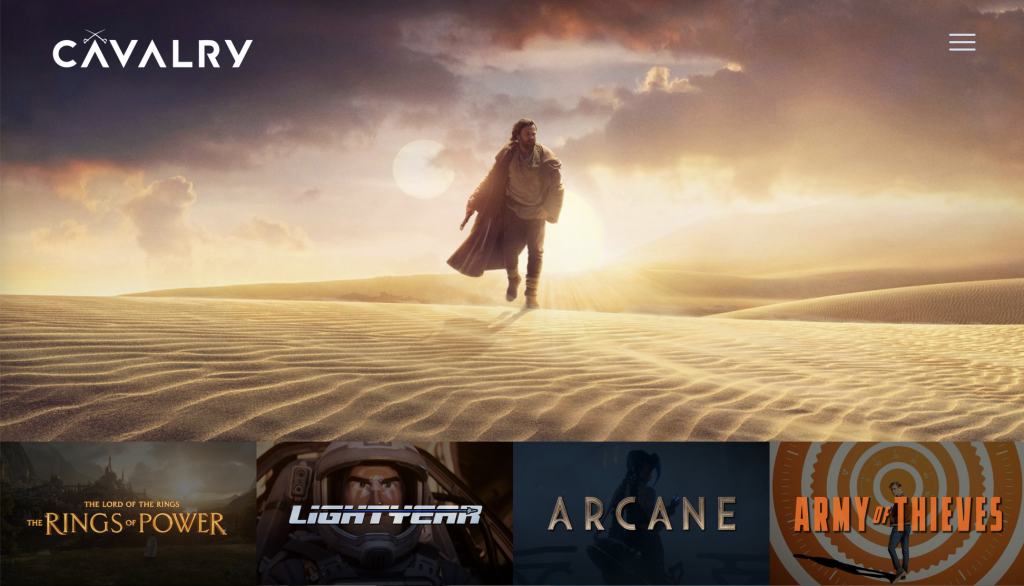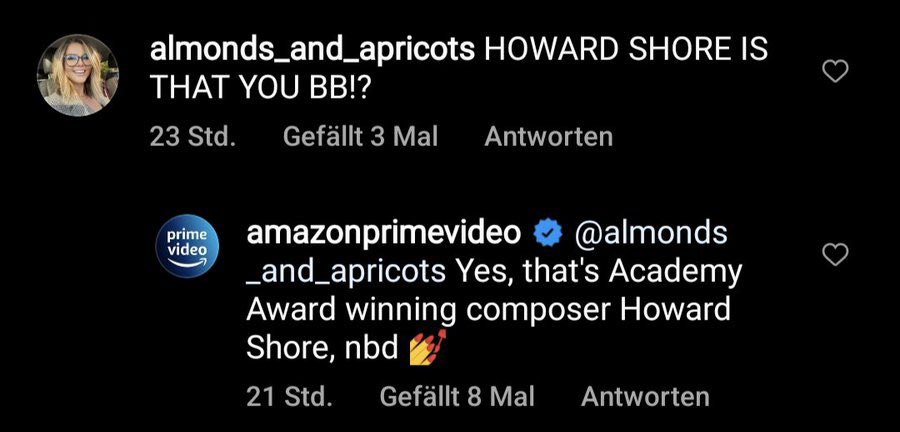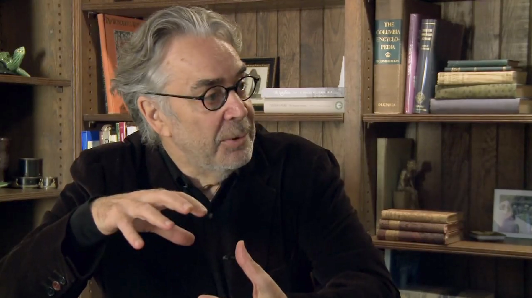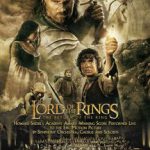Amongst my earliest recollections of being introduced to Tolkien there remains one etched in my memory that I remember so clearly to this day. It was an evening in the fall of 2001. I was accustomed to step out at dusk to catch the sunset near a plumeria tree outside my house which would shed its leaves and yellow flowers around that time of year. I’d watch for the first of the stars to appear, and then head home.
I lived in a little city in India back then, and after a day at college, I was relaxing in my living room watching MTV, when the video for Enya’s “May It Be” happened to come on.

That evening after watching Enya’s video for the very first time, I was ponderous in a way I hadn’t really been before.
Perhaps it was the season, or the stage of life I was at. But something about the visuals, the words, the characters, had touched me, spoken to me; and it set me on a journey of discovery into the Lord of the Rings, Middle-earth, and Tolkien.
It’s been over 20 years now, and though I now live far from that home in a land where the stars are strange (to borrow a Ranger’s phrase) and a lifetime seems to have passed since those days, the music of Peter Jackson’s The Lord of the Rings films has somehow managed to remain a constant companion through the seasons of my life.
Howard Shore’s score has always been, for me, the singular aspect of those films that contributed immensely in elevating the whole to be greater than the sum of its parts.

So when it was announced that the score for Amazon’s The Rings of Power TV series would be scored by Bear McCreary, I was both apprehensive and excited.
My apprehension stemmed from having spent two decades associating Howard Shore’s music with the sound of Middle-earth – how could anyone surpass, or even match, the heights of that achievement?
And yet my excitement was hesitantly brewing, as I had recently watched Apple TV’s Foundation, fallen in love with the soundtrack, and discovered that it was scored by a composer named Bear McCreary. Only time would reveal whether Bear’s music for Middle-earth would move me in the same way Shore’s did 20 years ago.
And so finally last weekend, on a grey and rainy Spring evening in Australia, separated in time and space from the once young college boy who accidentally discovered Middle-earth, I settled in, this time willfully, and with a slight shiver running down my spine, to journey anew, back to that place of wonder.
PROLOGUE: GALADRIEL & FINROD, MORGOTH & SAURON
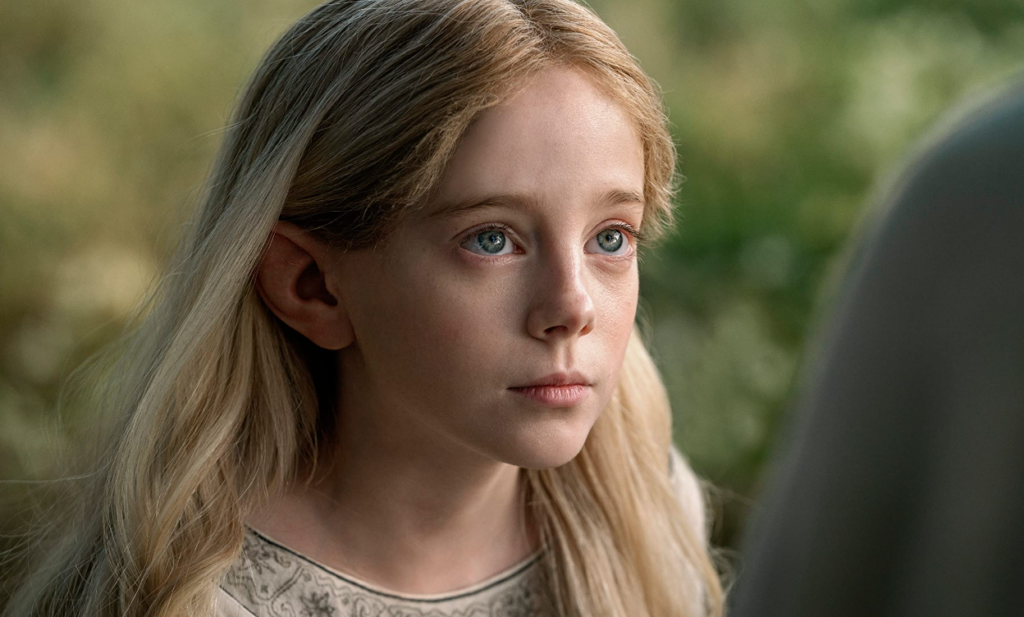
As the first strains of choral music play over the dark screen and a voice begins to speak, the mood feels aptly Tolkienesque, in an Elvish sort of way – ancient and fair – but also young and fresh, in a manner of speaking, as if the song were newly written, and being newly sung, within the world unfolding before me.
It coalesces in my mind when the Elf-children are revealed – this is the music of the Elves in their youth in Valinor, in a time when their world is still young, their children numerous, their happiness untainted.
The choral music gives way to a subtle thematic melody as a small girl crafts a boat and sets it upon a stream. The music rises delicately as the boat floats downstream, then slowly unfurls to take the shape of a swan, wings outspread, and begins to sail proudly upon the rippling water; before its course is interrupted by a stone pelted by one of the Elf-children.
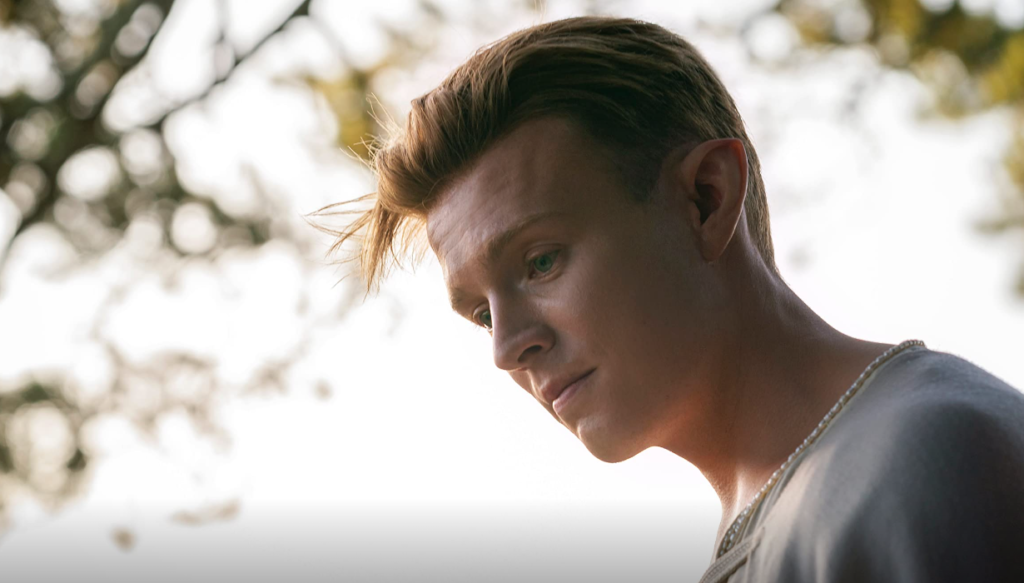
As a tall, fair Elf comes over and lifts it up out of the water, the theme weaves its way back into the music. It segues from doubtfulness to hope as Finrod the Elf-lord converses with his little sister Galadriel under a tree in a verdant field of grass, counseling her regarding the nature of darkness and light. Then leaving her to ponder his words, he departs homeward; and the theme builds gloriously, reaching a crescendo in a chorus of Elven song as he mounts a hill and gazes upon the fair city of their home, Valinor, whose tall towers and rippling waterways lay bathed in the golden light of the Two Trees.
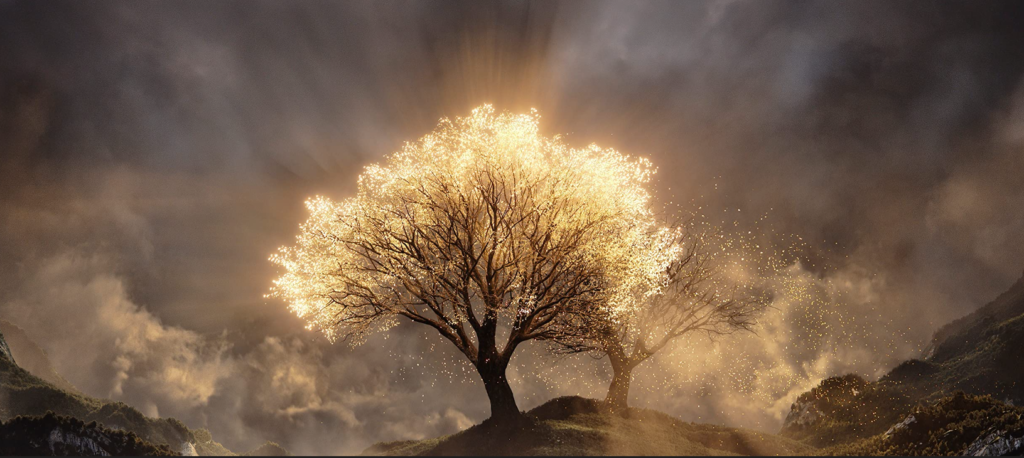
But soon another theme asserts itself – strident and dissonant. The Two Trees begin to darken as the shadow of the Great Foe, Morgoth, looms over them, and we witness their destruction and the consequent darkening of Valinor.
It made me wonder if this is what Morgoth’s theme might’ve sounded like woven amidst the Music of the Ainur. It is not immediately discordant, but rather rallying, and depending on one’s predisposition could very well induce a desire to ally oneself with it.
Now amid the darkness of their home, the Elf-lords unite to take an Oath in resistance of Morgoth’s evil, and leaving the land of Valinor behind, they sail in legion across the Sundering Seas to Middle-earth, and to war. The soaring music ushers their arrival in this land of untold perils, where battling for centuries against strange creatures beyond count, on land and high in the flaming skies, they witness the ruin of Middle-earth. Galadriel’s theme bears out a sombre tone as she treads the ashen, smoke-filled battleplains in the aftermath of war – laying in reverence the high-helm of a fallen Elf-lord upon a mound of countless others borne by those who fell in battle beside him.
As the Age rolls on, Morgoth’s theme comes to represent the evil that has spread across all Middle-earth. It is soon assumed by Sauron, his most devoted servant, and a choir intones in Black Speech as we see his armoured form in a forbidding Northern fortress commanding forces of Orcs that have multiplied and gathered under him.

We learn now that Finrod was killed in attempting to fulfil his vow to seek out Sauron, and once again, the Galadriel / Finrod theme plays out solemnly, as she weeps over his once-fair body now marred and lying in state.
A mysterious motif interrupts this moment as she looks upon a mark branded cruelly upon his breast. Her theme rises once again as she takes the dagger from Finrod’s hands and claims his vow as her own.
Despite his brief appearance, Finrod’s death felt extremely poignant, and I found I had a lump in my throat when he lay in state. It is clear to see why Galadriel assumed his task to hunt down the Enemy.

Galadriel’s theme now sweeps up dramatically as we are told how the Elves hunted for Sauron to the ends of the earth, over mountains and across seas, as year gave way to year, and century to century. And though for most Elves the pain of those days was all but forgotten, for Galadriel the fight against Sauron had become personal, and so she ever led her company on.
Now far in the Northernmost Waste, the Forodwaith of Middle-earth, menacing vocals sound out as she and her company descry the towers of an ancient fortress rising like black mountain-peaks amidst the frost and bitter snow. Then Sauron’s theme blares out as deep within a chamber they discover an enigmatic sigil – the same mark that once branded Finrod’s body – left here now as a trail for Orcs to follow. They had finally found a trace of Sauron.
RHOVANION: THE HARFOOTS, ELANOR ‘NORI’ BRANDYFOOT
We are now introduced to the Harfoots in the region of Rhovanion, the Wilderland of Middle-earth. They are a simple wandering folk, a little people living in closeness with the earth, never settled in one place but moving their dwellings with the passing of the seasons.
Their music is rustic and sylvan, almost nomadic, like it could precede what later becomes Howard Shore’s themes for the Hobbits and the Shire in their comfortable refinement.
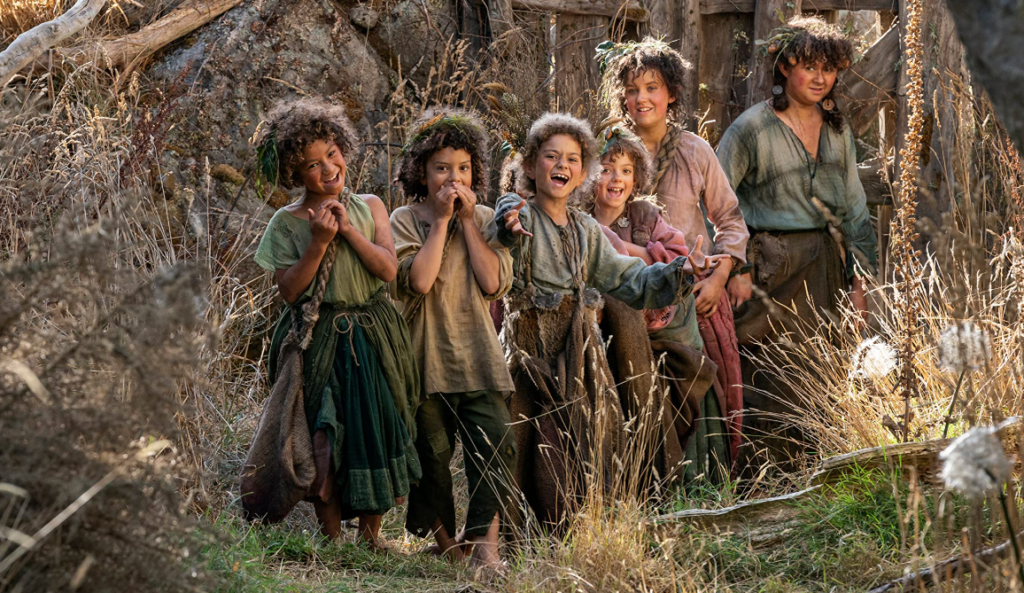
There’s a separate theme for Elanor ‘Nori’ Brandyfoot, who along with her companion Poppy Proudfoot, and the other Harfoot younglings are thrilled in their perky-eyed cheekiness to find a blackberry bush. Delighting in simple pleasures seems to be an innate trait of the Little Folk since their beginnings.
Nori’s theme is appropriately lighthearted and sprightly, if tinged with hints of wonder and expectation of something larger than might exist just beyond their horizons. It grows pensive as she asks of her mother Marigold…
Haven’t you ever wondered what’s out there? How far the river flows or where the sparrows learn their new songs they sing in spring?
The music for the Harfoots too takes a poignant turn as Marigold, her deep brown eyes filled with kind understanding, reminds Nori of the simple truths that keep their kind safe.
Elves have forests to protect, Dwarves their mines, Men their fields of grain, even trees have to worry about the soil beneath their roots. But we Harfoots are free from the worries of the wide world. Nobody goes off trail and nobody walks alone. We have each other.
It is a tender moment of motherly wisdom imparted to a daughter, and a reminder that although the Harfoots may be simple, they are not unwise.
I found myself already loving the Harfoot characters, despite their fabrication for this series, and I think it is a testament to the cast, the writers, and everything else that went into making the Harfoots believable within this world.
ELROND
Elrond, the Herald of Gil-galad, is ushered in with strains that seem reminiscent of Howard Shore’s Rivendell theme, as he sits (Frodo-like) quite carefree on a tree-branch in a golden wood.
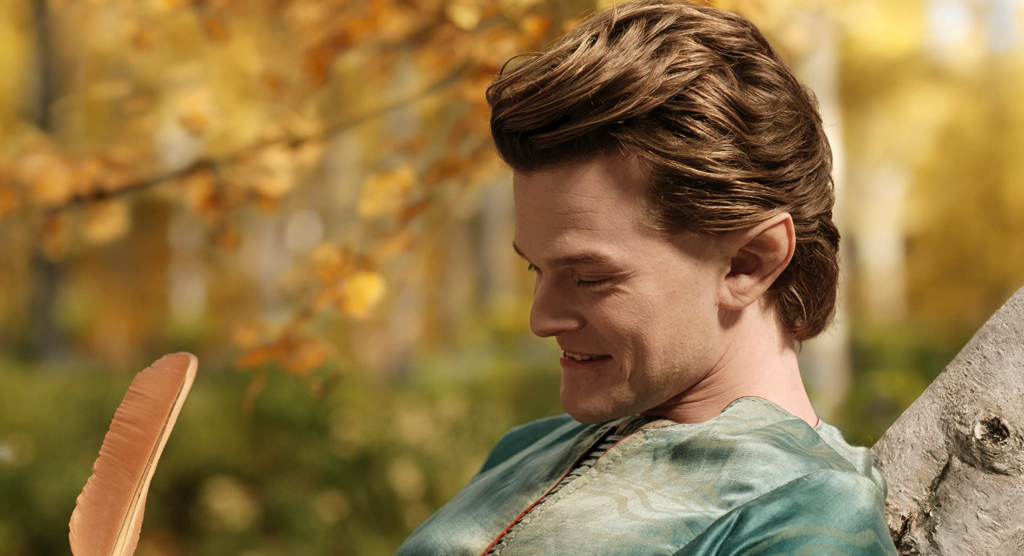
Here his theme seems to be in its inception still, yet in a reflection of his person, it soars briefly, bordering on aspirational, offering glimpses of greatness.
He greets Galadriel, now returned from her journeying, and as they look upon the tapestry of a ship sailing West to Valinor, a choral motif is briefly heard.
Then as he reflects upon the tapestry while conversing with Galadriel, he wonders aloud…
“I hear it’s said that when you cross over, you hear a song. One whose memory we all carry.”
… and the choir intones a lyric to a different melodic line.
We will later discover that this choral lyric is indeed the very song Elrond is talking about.
LINDON & GIL-GALAD
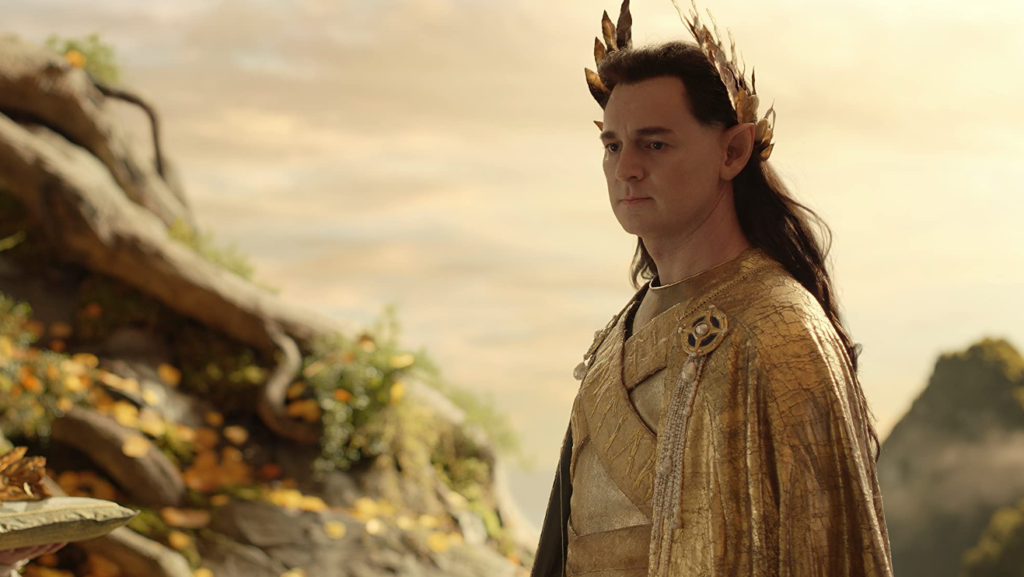
Now the choral music builds as Elrond, Galadriel, and many other Elves assemble in a court encircled by many golden-leaved trees deep in the heart of Lindon, summoned there by Gil-galad.
The high and lofty vocals might represent a motif not dissimilar to Elrond’s Rivendell theme in The Lord of the Rings; for in this Second Age, Gil-galad is the High King of the Elves in Middle-earth, and though their capital city is in Lindon in the North-west, his authority is acknowledged by all their companies even to the furthest Southern and Eastern lands.
It sounds out victoriously as he declares that their days of war are over – their days of peace now begun.
But now Galadriel’s theme softly presents itself as she kneels ceremoniously before Gil-galad and he lays a circlet upon her head, bestowing upon her and the other Elven heroes of her company the permission to leave his realm and board the ships, to return home once more to Valinor.
Later that night, while the Elves celebrate, Galadriel’s theme plays out in poignant tones as she regards the carven image of Finrod in a forest-glade and converses once again with Elrond about the choice before her – to accept the gift of Gil-galad and depart Middle-earth forever, forsaking her vow, or to refuse his gift and persevere in her search for Sauron.
A LEITMOTIF FOR VALINOR
A subtle rising choral piece plays when Gil-glad mentions the Blessed Realm.
It is the motif briefly heard earlier when Elrond looked upon the tapestry when he greeted Galadriel.
It is also the same melodic line which played at the beginning when we saw Galadriel with the other Elf-children in Valinor and we heard how…
Nothing is evil in the beginning. And there was a time when the world was so young, there had not yet been a sunrise, but even then, there was light.
THE SOUTHLANDS, BRONWYN & ARONDIR
The theme for the Southlands is bucolic but dismal, as the Men who live here seem to be a rather simple farming folk settled in villages, but it is said their ancestors once sided with Morgoth, and the Elves still distrust them for that treachery.

The theme is shared by the Elves too; for they have established their presence in these regions for decades in their duty to watch over these Men and their lands.
It ushers in two Elves, Arondir and Médhor, who arrive at the village of Tirharad and head to an inn seeking news.

Arondir steps out onto the inn’s backyard to meet a woman, Brownyn, standing there beside a well, and a tender new theme forms as she hands him a bottle containing seeds of alfirin, a flower which he once knew as a child, but whose petals she herself crushes to form a healing salve. The theme continues as she questions him regarding healers among their kind, and he in turn explains the nature of their wounds and the role of Elvish healers.
The theme for the Southlands returns once again as Arondir heads back with his companion Medhor to Ostirith, an Elvish outpost set high upon a cliff-face. Upon receiving news that Gil-galad has declared the days of war ended, and the Elf-watchers free to return home, Arondir looks morosely across the wide vales far below, the theme sounding ever more forlorn.
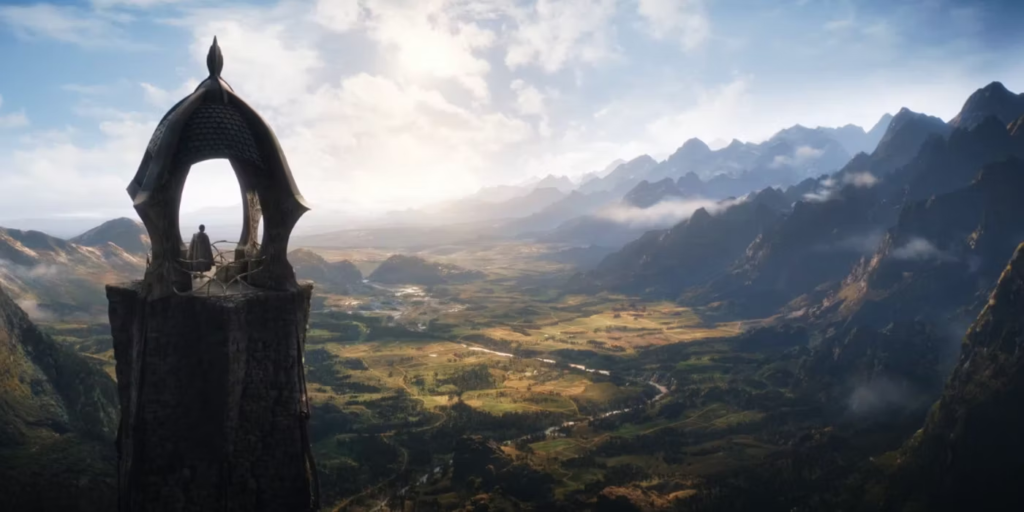
As Revion the Watchwarden joins him atop the tower and they regard the lush green fields under the golden sunlight, Arondir remarks about the change to this once-barren land, and the Southlands theme brims briefly with new hope; but it returns to grimness as Revion reminds him that although the land may have the changed, the people have not.
The theme for Bronwyn & Arondir returns as he considers their impending separation, and later reminds her that although he seems unable to articulate why he has returned to see her, he has already spoken it in every way but words.
Their conversation is interrupted by the arrival of a man who has brought his sick cow to Bronwyn, and Sauron’s theme hints amid the music as they learn the cow has been poisoned from grazing near the neighbouring village of Hordern. The theme rises prominently as Arondir and Bronwyn set out urgently for Hordern.

While Bronwyn is away, her son Theo shows his friend Rowan a mysterious broken sword he had discovered in a nearby shed. It bears the enigmatic sigil of Sauron, and now it holds Theo’s gaze as he holds it up, seemingly alighting in fire as the choir erupts in Black Speech over Sauron’s theme.
Arriving on the borders of Hordern, the theme for Arondir and Bronwyn returns as they share a tender moment when he confesses that hers is the only kind touch he has known in all his days in that land. But dark clouds formed from a rising smoke remind them of their purpose in coming to Hordern, and Sauron’s theme rises in urgency as they run up a hill to look down upon the village all aflame.
CELEBRIMBOR & THE RINGS OF POWER
Meanwhile in Lindon, Elrond and Gil-galad discuss Galadriel’s decision to return to the West, and having passed beyond his sight, Elrond shares his doubts about convincing her to take ship.
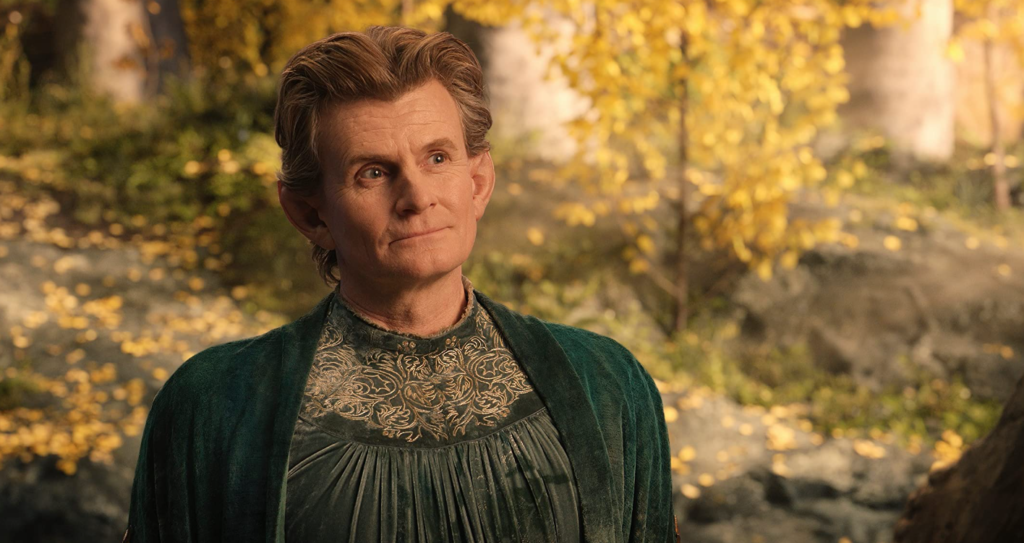
But Gil-galad counsels him to look to his own future in Middle-earth now, and thereupon Celebrimbor joins them.
His first appearance is accompanied by a short, rather ominous choral line.
It is the same piece that played over the title card of the show “THE LORD OF THE RINGS: THE RINGS OF POWER” (S1E1 at 17:27).
Celebrimbor is of course the primary artificer of the Rings of Power – their threads are bound by this motif.
THE SONG OF THE ELVES
Away upon the Sundering Seas, Galadriel and the Elven heroes gather on deck and prepare in ceremony to pass into the Uttermost West.
The leitmotif for Valinor heralds their arrival to the confines of the Blessed Realm. The choir begins to intone as the dark and forbidding clouds part, permitting the golden light of Valinor to shine forth, and a phalanx of white birds flies out to greet them.
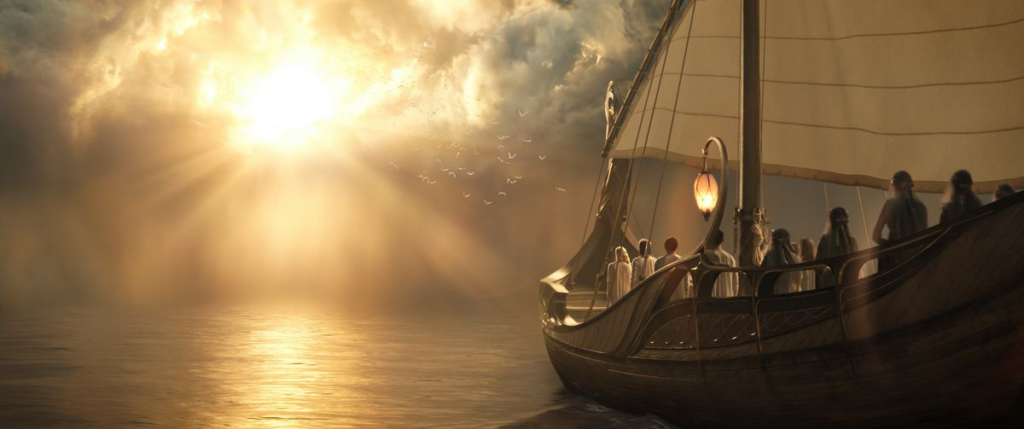
Gazing in wonder at the ever widening cloud-wrack and the light of Valinor blazing forth ever brighter, the Elves in unison begin chanting a verse, almost as if the memory of a song long-forgotten were suddenly wakened fully in them.
It is the choral piece we heard when Elrond conversed with Galadriel by the tapestry in Lindon.
But while the accompanying Elves sing it and begin moving forward to enter into the light, Galadriel remains silent, filled with doubt about her choice to leave Middle-earth, and steps slowly back. Thondir’s call to take his hand grows distant.
The music rises and she recalls her discourse with Finrod when as a child she had questioned him about discerning which lights she must follow – the ones shining in the sky or those reflected as brightly in the dark waters below.
The Galadriel / Finrod theme rises profoundly as she remembers his counsel:
Sometimes we cannot know until we have touched the darkness.
Perceiving now his words and comprehending her choice, she turns away from the light, a tear escapes her, and she leaps from the ship.
The clouds close in again to shut out the light, darkness engulfs the waters, and all music is silenced.
THE STRANGER
Above the lands in Middle-earth the skies have grown strange. The music grows portentous and a queer motif begins to take shape. From Lindon and Eregion in the North, to Rhovanion and as far as the Southlands, Elves, Men, and Harfoots gaze in bewilderment as a star seemingly in flight streaks across the firmament leaving a blazing trail in its wake. The wind picks up and the trees too herd their young nearer to safety.
Gil-galad picks up a leaf that falls before him and regards it questioningly. The motif builds as he turns it over and sees a darkness spreading across its veins. Sauron’s theme interleaves with this new motif.
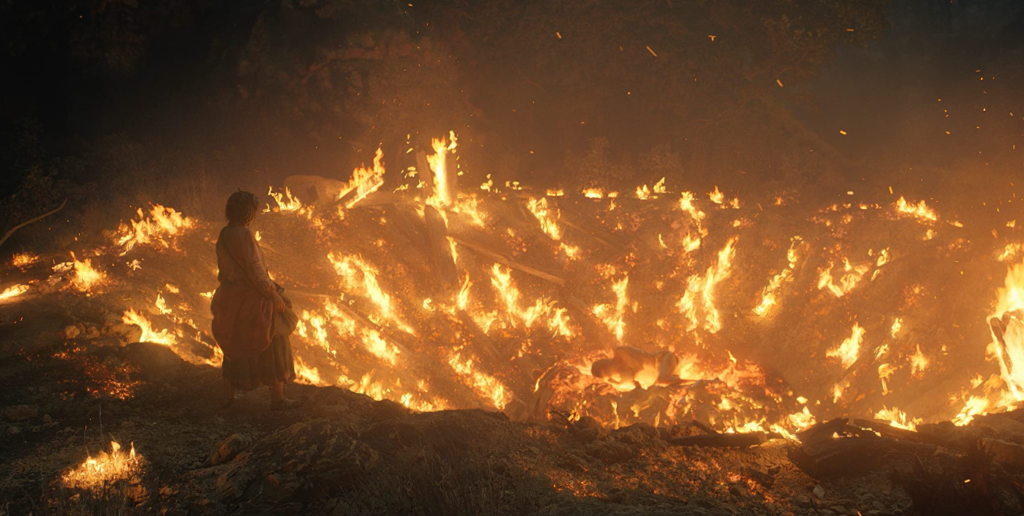
Away in Rhovanion, Nori approaches the crater where she descried the mysterious heavenly body crashing in an explosion of flame. Sauron’s theme segues into the new theme and the choir erupts as she looks down into the crater in amazement to see a man lying curled up at its center.
I find it interesting how the themes for the Stranger and Sauron seem intertwined. I don’t necessarily think it suggests the Stranger and Sauron are the same person or that they are allied – the Stranger could be one of the protagonists sent to contend with Sauron – but it certainly seems to hint that there is a close connection between them.
WHERE THE SHADOWS LIE
The music for the end credits is strangely ominous, the choir transitioning from deep male guttural voices to high female vocals, culminating on a seemingly unresolved note.
If I may say so, the credits sequence quite gave me Gollum’s Song vibes, and felt very reminiscent of the end credits of The Two Towers, which itself had a powerfully ominous ending complemented by Emiliana Torrini’s haunting vocals.
CONCLUDING NOTES
I am the type of person who likes my first experience of a soundtrack to be within the context for which it was written, and I am refraining from listening to any music until I watch the show. My thoughts here are therefore based on first watching the episode, and then subsequently listening to its accompanying score (Amazon is releasing definitive albums for each episode after their respective airdates; here is the album for Season 1: Episode 1: A Shadow of the Past).
After having watched Episode 1, I feel I can lay aside my apprehensions about Bear’s association with the music for Middle-earth. I was afraid it might’ve sounded like any other “epic” movie music (which my ears have become a little more aware of in things I’ve watched ever since discovering the music of The Lord of the Rings films); but I am so ecstatic that Bear’s score feels uniquely organic to Middle-earth, and evocative of it.
While it is different from Shore’s, it still feels complementary to it, and in the words of Bilbo Baggins, I sheepishly venture to admit that “I think I am quite ready for another adventure”.
About the author
I have been associated with TheOneRing.net since the early 2000s. I consider myself a casual fan of Tolkien, Peter Jackson’s films, and Howard Shore’s scores. I am not a writer or musician, but I enjoy pondering over and talking about the music and songs of these adaptations in my own amateur way; and describing how they make me feel. I am more interested in the thematic and evocative nature of this music than in the analysis of its structure and composition.
Related Content
Here are some interviews I have conducted in the past with vocalists from The Lord of the Rings films.
- Plan 9 & David Long – Composed and performed diegetic music for Frodo’s “chicken dance” at Bilbo’s Birthday party, Merry and Pippin’s Drinking Song at the Green Dragon Inn, “A Elbereth Gilthoniel” which Frodo and Sam hear when watching the Wood-elves leave Middle-earth, and Éowyn’s Dirge at the burial of Théodred.
- Miriam Stockley – Performed “The Footsteps Of Doom” in The Fellowship of the Ring.
- Hilary Summers – Performed “Gilraen’s Song” in The Fellowship of the Ring (Extended Edition).
- Aivale Cole (nee Mabel Faletolu) – Performed vocals when the Fellowship mourn Gandalf’s fall in The Fellowship of the Ring.
- Sheila Chandra – Performed “The Breath Of Life“, alternatively titled “The Grace Of The Valar“, in The Two Towers.



